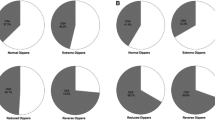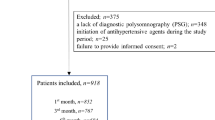Abstract
High heterogeneity in the blood pressure (BP) response to continuous positive airway pressure (CPAP) exists in patients with resistant hypertension (RH). Only nondipper normotensive and hypertensive patients exhibited BP reductions when treated with CPAP; the baseline BP dipping pattern has been proposed as a predictor of BP response to CPAP but has never been explored in patients with RH. This study aimed to assess the effect of CPAP on BP in subjects with RH with respect to BP dipping pattern or nocturnal hypertension. This is an ancillary study of the SARAH study. RH subjects with an apnea/hypopnea index (AHI) ≥ 15/h and who received CPAP treatment for 1 year were included. Subjects underwent a sleep study and ambulatory BP monitoring (ABPM) at baseline and at the 1-year follow-up. Eighty-nine RH subjects were included. The subjects were mainly male (77.5%) and obese, with a mean age of 66 years (25th–75th percentile; 59.0; 70.0) and an AHI of 32.7/h (25th–75th percentile; 25.0; 54.7). A total of 68.5% of participants were nondippers, and 71.9% had nocturnal hypertension. After 1 year of CPAP, no significant differences in ABPM parameters were observed between dippers and nondippers. According to nighttime BP, subjects with nocturnal normotension did not show significant changes in ABPM parameters, while nocturnal hypertensive subjects achieved a significant reduction in mean nighttime BP of −4.38 mmHg (−7.10 to −1.66). The adjusted difference between groups was 3.04 (−2.25 to 8.34), which was not significant. This study shows that the BP response to CPAP in patients with RH does not differ according to the BP dipping pattern (dipper and nondipper) and suggests a differential response according to the presence of nocturnal hypertension (ClinicalTrials.gov: NCT03002558).
This is a preview of subscription content, access via your institution
Access options
Subscribe to this journal
Receive 12 print issues and online access
$259.00 per year
only $21.58 per issue
Buy this article
- Purchase on Springer Link
- Instant access to full article PDF
Prices may be subject to local taxes which are calculated during checkout

Similar content being viewed by others

References
Lévy P, Kohler M, McNicholas WT, Barbé F, McEvoy RD, Somers VK, et al. Obstructive sleep apnoea syndrome. Nat Rev Dis Prim. 2015;1:1–20.
Peppard PE, Young T, Palta M, Skatrud J. Prospective study of the association between sleep-disordered breathing and hypertension. N Engl J Med. 2000;342:1378–84.
Marin M, Forner M, Carrizo SJ. Association Between Treated and untreated obstructive sleep apnea and risk of hypertension. JAMA. 2012;307:2169–76.
Hou H, Zhao Y, Yu W, Dong H, Xue X, Ding J, et al. Association of obstructive sleep apnea with hypertension: a systematic review and meta-analysis. J Glob Health. 2018;8:1–10.
Pedrosa RP, Drager LF, Gonzaga CC, Sousa MG, De Paula LKG, Amaro ACS, et al. Obstructive sleep apnea: the most common secondary cause of hypertension associated with resistant hypertension. Hypertension. 2011;58:811–7.
Sapiña-Beltran E, Torres G, Benitez I, Fortuna-Gutierrez AM, Marquez PP, Masa JF, et al. Prevalence, characteristics, and association of obstructive sleep apnea with blood pressure control in patients with resistant hypertension. Ann Am Thorac Soc. 2019;16:1414–21.
Ohkubo T, Hozawa A, Yamaguchi J, Kikuya M, Ohmori K, Michimata M, et al. Prognostic significance of the nocturnal decline in blood pressure in individuals with and without high 24-h blood pressure: the Ohasama study. J Hypertens. 2002;20:2183–9.
Fan H-Q, Li Y, Thijs L, Hansen TW, Boggia J, Kikuya M, et al. Prognostic value of isolated nocturnal hypertension on ambulatory measurement in 8711 individuals from 10 populations. J Hypertens. 2010;28:2036–45.
Dolan E, Stanton A, Thijs L, Hinedi K, Atkins N, McClory S, et al. Superiority of ambulatory over clinic blood pressure measurement in predicting mortality: the Dublin outcome study. Hypertension. 2005;46:156–61.
Hansen TW, Li Y, Boggia J, Thijs L, Richart T, Staessen JA. Predictive role of the nighttime blood pressure. Hypertension. 2011;57:3–10.
Marin JM, Carrizo SJ, Vicente E, Agusti AG, Marin JMCS, et al. Long-term cardiovascular outcomes in men with obstructive sleep apnoea-hypopnoea with or without treatment with continuous positive airway pressure: an observational study. Lancet. 2005;365:1046–53.
Iftikhar IH, Valentine CW, Bittencourt LRA, Cohen DL, Fedson AC, Gíslason T, et al. Effects of continuous positive airway pressure on blood pressure in patients with resistant hypertension and obstructive sleep apnea: a meta-analysis. J Hypertens. 2014;32:2341–50.
Martínez-García MA, Capote F, Campos-Rodríguez F, Lloberes P, Josefa Díaz de Atauri M, Somoza M, et al. Effect of CPAP on blood pressure in patients with obstructive sleep apnea and resistant hypertension the HIPARCO randomized clinical trial. JAMA. 2013;310:2407–15.
Pedrosa RP, Drager LF, De Paula LKG, Amaro ACS, Bortolotto LA, Lorenzi-Filho G. Effects of OSA treatment on BP in patients with resistant hypertension: a randomized trial. Chest. 2013;144:1487–94.
Liu L, Cao Q, Guo Z, Dai Q. Continuous positive airway pressure in patients with obstructive sleep apnea and resistant hypertension: a meta-analysis of randomized controlled trials. J Clin Hypertens. 2016;18:153–8.
Sapiña-Beltrán E, Santamaria-Martos F, Benítez I, Torres G, Masa JF, Sánchez-de-la-Torre M, et al. Normotensive patients with obstructive sleep apnoea: changes in 24-h ambulatory blood pressure monitoring with continuous positive airway pressure treatment. J Hypertens. 2019;37:720–7.
Sapiña-Beltrán E, Torres G, Benítez I, Santamaría-Martos F, Durán-Cantolla J, Egea C, et al. Differential blood pressure response to continuous positive airway pressure treatment according to the circadian pattern in hypertensive patients with obstructive sleep apnoea. Eur Respir J. 2019;54:1900098.
Castro-Grattoni AL, Torres G, Martínez-Alonso M, Barbé F, Turino C, Sánchez-de-la-Torre A, et al. Blood pressure response to CPAP treatment in subjects with obstructive sleep apnoea: the predictive value of 24-h ambulatory blood pressure monitoring. Eu Respir J. 2017;50:1700651.
Whelton PK, Robert Carey CM, Chair Wilbert Aronow VS, Ovbiagele B, Casey DE, Smith SC, et al. 2017 ACC/AHA/AAPA/ABC/ACPM/AGS/APhA/ASH/ASPC/NMA/PCNA guideline for the prevention, detection, evaluation, and management of high blood pressure in adults a report of the American College of Cardiology/American Heart Association Task Force on Clinical Practice. Hypertension. 2017;71:e13–e115.
Sapiña-Beltrán E, Torres G, Martínez-Alonso M, Sánchez-de-la-Torre M, Franch M, Bravo C, et al. Rationale and methodology of the SARAH trial: long-term cardiovascular outcomes in patients with resistant hypertension and obstructive sleep apnea. Arch Bronconeumol. 2018;54:518–23.
Chiner E, Arriero JM, Signes-Costa J, Marco J, Fuentes I. Validación de la versión española del test de somnolencia Epworth en pacientes con síndrome de apnea de sueño. Arch Bronconeumol. 1999;35:422–7.
Mancia G, Fagard R, Narkiewicz K, Redon J, Zanchetti A, Böhm M, et al. 2013 ESH/ESC guidelines for the management of arterial hypertension: The Task Force for the management of arterial hypertension of the European Society of Hypertension (ESH) and of the European Society of Cardiology (ESC). Eur Heart J. 2013;34:2159–219.
Williams B, Mancia G, Spiering W, Rosei EA, Azizi M, Burnier M, et al. 2018 ESC/ESH Guidelines for themanagement of arterial hypertension. J Hypertens. 2018;36:1953–2041.
Lloberes P, Durán-Cantolla J, Martínez-García MÁ, Marín JM, Ferrer A, Corral J, et al. Diagnóstico y tratamiento del síndrome de apneas-hipopneas del sueño. Arch Bronconeumol. 2011;47:143–56.
Masa JF, Jiménez A, Durán J, Capote F, Monasterio C, Mayos M, et al. Alternative methods of titrating continuous positive airway pressure: a large multicenter study. Am J Respir Crit Care Med. 2004;170:1218–24.
Bunn A, Korpela M. An introduction to dplR. https://doi.org/10.1016/j.dendro.2008.01.002.
Fava C, Dorigoni S, Dalle Vedove F, Danese PharmDE, Montagnana M, Cesare Guidi G, et al. Effect of CPAP on blood pressure in patients With OSA/hypopnea: a systematic review and meta-analysis. Chest. 2014;145:762–71.
Bratton DJ, Stradling JR, Barbé F, Kohler M. Effect of CPAP on blood pressure in patients with minimally symptomatic obstructive sleep apnoea: A meta-analysis using individual patient data from four randomised controlled trials. Thorax. 2014;69:1128–35.
Navarro-Soriano C, Martínez-García MA, Torres G, Barbé F, Caballero-Eraso C, Lloberes P, et al. Effect of continuous positive airway pressure in patients with true refractory hypertension and sleep apnea: A post-hoc intention-to-treat analysis of the HIPARCO randomized clinical trial. J Hypertens. 2019;37:1269–75.
Hermida RC, Ayala DE, Smolensky MH, Fernández JR, Mojón A, Portaluppi F. Chronotherapy with conventional blood pressure medications improves management of hypertension and reduces cardiovascular and stroke risks. Hypertens Res. 2015;39:277–92.
Hermida RC, Crespo JJ, Domínguez-Sardiña M, Otero A, Moyá A, Ríos MT, et al. Bedtime hypertension treatment improves cardiovascular risk reduction: the Hygia Chronotherapy Trial. Eur Heart J. 2019;0:1–12.
Hermida RC, Ayala DE, Calvo C, López JE, Mojón A, Fontao MJ, et al. Effects of time of day of treatment on ambulatory blood pressure pattern of patients with resistant hypertension. Hypertension. 2005;46:1053–9.
Hermida RC, Ayala DE, Mojón A, Fernández JR. Effects of time of antihypertensive treatment on ambulatory blood pressure and clinical characteristics of subjects with resistant hypertension. Am J Hypertens. 2010;23:432–9.
Kasiakogias A, Tsioufis C, Thomopoulos C, Andrikou I, Aragiannis D, Dimitriadis K, et al. Evening versus morning dosing of antihypertensive drugs in hypertensive patients with sleep apnoea: a cross-over study. J Hypertens. 2015;33:393–400.
Javaheri S, Barbe F, Campos-Rodriguez F, Dempsey JA, Khayat R, Javaheri S, et al. Sleep apnea: types, mechanisms, and clinical cardiovascular consequences. J Am Coll Cardiol. 2017;69:841–58.
Ahmad M, Makati D, Akbar S. Review of and updates on hypertension in obstructive sleep apnea. Int J Hypertens. 2017;2017:1848375.
Chobanian AV, Bakris GL, Black HR, Cushman WC, Green LA, Izzo JL, et al. The seventh report of the Joint National Committee on prevention, detection, evaluation, and treatment of high blood pressure: the JNC 7 report. JAMA. 2003;289:2560–72.
Staessen JA, Wang J, Thijs L. Cardiovascular protection and blood pressure reduction: a meta-analysis. Lancet. 2001;358:1305–15.
Acknowledgements
We thank all clinical personnel of all participating centers that contributed to the study. This work was supported by IRBLleida Biobank (B.0000682) and PLATAFORMA BIOBANCOS (PT17/0015/0027). This work was supported by ISCIII y fondos FEDER “Una manera de hacer Europa” (PI19/00907), the Spanish Respiratory Society (SEPAR), ResMed Foundation and Societat Catalana d’Hipertensió Arterial (SCHTA), Philips and FENIN.
Author information
Authors and Affiliations
Corresponding author
Ethics declarations
Conflict of interest
The authors declare no competing interests.
Additional information
Publisher’s note Springer Nature remains neutral with regard to jurisdictional claims in published maps and institutional affiliations.
Supplementary information
Rights and permissions
About this article
Cite this article
Sapiña-Beltrán, E., Benitez, I.D., Torres, G. et al. Effect of CPAP treatment on BP in resistant hypertensive patients according to the BP dipping pattern and the presence of nocturnal hypertension. Hypertens Res 45, 436–444 (2022). https://doi.org/10.1038/s41440-021-00762-7
Received:
Revised:
Accepted:
Published:
Issue Date:
DOI: https://doi.org/10.1038/s41440-021-00762-7
Keywords
This article is cited by
-
Resistant hypertension: consensus document from the Korean society of hypertension
Clinical Hypertension (2023)
-
Role of home blood pressure monitoring in resistant hypertension
Clinical Hypertension (2023)
-
The combination of nondipper pulse rate pattern and nighttime high pulse rate variability is associated with an increase of brain natriuretic peptide: the J-HOP study
Hypertension Research (2023)
-
Obstructive sleep apnea and non-dipper: epiphenomena or risks of Alzheimer’s disease?: a review from the HOPE Asia Network
Hypertension Research (2023)


